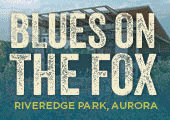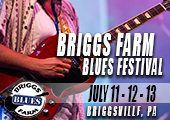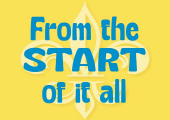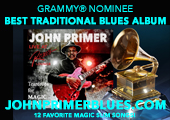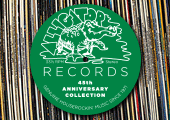MR. SIPP
The Mississippi Blues Child
Malaco – MCD7547
It was scarcely more than a year ago that Malaco gospel recording artist Castro Coleman completed his metamorphosis to Mr. Sipp, The Mississippi Blues Child (he’s from McComb), and now after winning the 2014 International Blues Challenge, releasing the impressive self-produced “debut” It’s My Guitar and appearing on the cover of Living Blues, he’s back on Malaco for his eponymous follow-up.
In contrast to its predecessor, where Sipp played all the instruments, this album finds him in the company of Damien Stauder or Michael Thomas on organ, Jeffrey Flanagan on bass, Stanley Dixon or Timothy Henderson on drums and a three-piece horn section arranged by the esteemed Harrison Calloway. While It’s My Guitar was pretty much a straight blues album, here Sipp mixes in the dose of soul-blues that one would expect from a Malaco product. The opening TMBC is the Mississippi Blues Child’s anthemic, abbreviated autobiography, after which Chris Gill’s slide guitar adds an appropriate Elmore James touch to Jump the Broom and In the Fire reveals a Hendrix influence. Hole in My Heart and Nobody’s Business are hard-hitting contemporary blues, while Say the Word is an after-hours slow blues and Jackpot provides a counterpoint to the Johnnie Taylor casino classic Last Two Dollars while also echoing Detroit Junior’s Call My Job. There’s the obligatory dance floor workout on Sipp Slide, Hold it in the Road strikes a Tyrone Davis groove and Be Careful smolders in a minor key, but the remaining four selections—oddly, all programmed near the end of the album—are bedroom ballads. No matter the style, though, Mr. Sipp is up to the task, again proving himself worthy as singer, guitarist and songwriter.
Coming hot on the heels of equally fine releases by Miss Emily and Grady Champion, this disc provides further proof that Malaco is ready to be a force on the blues scene again.
—Jim DeKoster
JEWEL BROWN, FEAT. BLOODEST SAXOPHONE
Roller Coaster Boogie
Dynaflow – DF-0001
Vocalist Jewel Brown, who was profiled in LB #236, has had a career spanning over 65 years that has included stints with the likes of Lionel Hampton, Earl Grant, Louis Armstrong, Arnett Cobb and Dizzy Gillespie and veteran guitarist Milton Hopkins. This set, recorded in Japan last year, shows that her voice has lost none of its range or suppleness, and her spirit remains strong—she attacks everything with the gusto of a hot-blooded chanteuse in her prime, and she has the chops to pull it off. As she told LB’s Roger Wood, “I don’t do gimmicks . . . I give it all my soul.”
Not many 78-year-olds could tackle material like the antic torch song That’s a Pretty Good Love; the hot-to-trot soul sister’s anthem One Monkey Don’t Stop No Show; the jubilant wronged-woman’s declaration of triumph Goody Goody or the lushly romantic Don’t Go to Strangers and sound convincing, but Ms. Brown does. Her timbre is supple, clear and astonishingly youthful; her melodic and rhythmic sense are unerring yet loose enough to allow her to embellish her lines with subtle but eloquent improvisational colorations. This is no retro-chic “swing-revivalist” outing but an in-the-moment celebration of timeless music, delivered with the self-confident brio of a veteran both savvy and ebullient, life-toughened yet exuding the kind of soul nourishing joy that cannot be faked.
The band comport themselves with a balanced combination of hard-swinging earnestness and gonzo-fueled R&B anarchy, most notably tenor man Koda “Young Corn” Shintaro’s bar-walking sax honks and trombonist Coh’s joyfully irreverent tailgate blats. And speaking of irreverence, Jewel Brown has the last word with her remake of Ain’t Nobody’s Business, in which she finally redeems the song’s notorious references to domestic violence by changing the protagonist into the singer herself. It’s a perfect sign-off by Ms. Brown, for whom the blues remains a celebration of strength, dignity and survival—which is to say, life.
—David Whiteis
BERNARD ALLISON GROUP
In The Mix
Jazzhaus – JHR 106
It comes as something of a shock to realize that Bernard Allison first recorded 36 years ago when, as a 13-year-old, he played on his dad Luther’s live LP for Rumble Records. His first album under his own name came out on Mondo in 1992, and since then he’s released a steady stream of quality recordings, the latest of which is this offering on the German Jazzhaus label.
Recording in Minneapolis with his working group—Mark “Muggie Doo” Leach on keyboards, George Moye on bass and Mario Dawson on drums, with an occasional assist from saxophonist José Ned James and pianist Bruce B. McCabe—Allison mixes covers and originals equally on the ten-track playlist. After opening with a rock-tinged Five Long Years (Colin James, not Eddie Boyd), Allison evokes Tyrone Davis on Call Me Momma before covering him on I Had It All the Time and pays respect to his father by interpreting two of his best songs, Move From the Hood and Moving on Up. The younger Allison’s blues roots are also evident in his cover of I’d Rather Be Blind (Freddie King, not Etta James) and Something’s Wrong, his own up-to date take on a Jimmy Reed beat. Of Allison’s other two originals, Tell Me Who is a soulful ballad and Set Me Free is an easy rolling blues.
Allison’s avowed purpose for this release was to spotlight his arranging and songwriting skills while avoiding an excess of screaming guitar. At this he has succeeded admirably, placing In The Mix among his most consistently satisfying efforts yet.
—Jim DeKoster
PHIL WIGGINS & THE CHESAPEAKE SHEIKS
No Fools No Fun
Silverbirch – No #
Piedmont harmonica maestro Phil Wiggins hasn’t exactly been inactive since the death of his longtime musical partner, guitarist John Cephas, in 2009, but his public profile has diminished somewhat. If this set is any indication, though, he’s still near the top of his game.
Wiggins’ notes cite artists as diverse as the Mississippi Sheiks, Louis Armstrong, Duke Ellington, the Big Three Trio and the hipster-jive duo of pianist/vibist Slim Gaillard and bassist Slam Stewart as inspirations for this music. But rather than attempt to duplicate the genius fueled musicianship that infused many of the original versions of these tunes, Wiggins and his compatriots simply put the hammer down and charge straight ahead, not sacrificing fun for technique, yet remaining focused and disciplined (musically, at least) throughout.
Wiggins’ spoken intros are in turn nostalgic, profound and hilarious; the fare ranges from tributes to the group’s ostensible role models—several Armstrong classics; Ellington’s Do Nothin’ Till You Hear From Me; the Big Three Trio’s Don’t Let That Music Die and Slim and Slam’s Frim Fram Sauce; among others—along with various oddities that nonetheless fit perfectly (although without composer credits, it’s a bit hard to tell whether some are originals or not). Wiggins’ voice may lack suppleness, but for a set like this it hardly matters. Violinist Marcus Moore’s serpentine lines caress and tickle; pianist Ian Walters enriches his barrelhouse/boogie rootsiness with a tinge of post-Powell chordal sophistication; bassist Eric Shrameck never stops rocking but remains rock-steady (his Dixon-esque solo on Don’t Let That Music Die is a special treat); guitarist Matt Kelly explodes with imagination, never departing from the traditionalist mood but avoiding clichés; Wiggins’ harp work is as dexterous as ever, his tone tubular and unforced, his lines deft and imaginative.
Too often, “revivalist” outings like this can sound ossified and over earnest. In this case, though, Wiggins’ proclamation that he and the Sheiks are “just five fools that love this music, having fun” serves as both a statement of purpose and a reassurance: it’s nothing but a party, and a good time is had by all.
—David Whiteis
A.J. GHENT BAND
Live at Terminal West
Blue Corn Music – BCM 1501
Still in his 20s, A.J. Ghent hails from Fort Pierce, Florida, and comes from a family who is deeply rooted in the sacred steel tradition. His great uncle Willie Eason is one of the original pioneers of the form, and his father, Aubrey Ghent, continues to perform sacred steel music today.
Although steeped in this tradition, Ghent departs from it in two primary ways: first, he plays slide standing up (rather than sitting down) and in a distinctive “over the top” style not unlike Australian blues guitarist Dave Hole, but on a very different instrument—an eight-string hybrid between a lap steel guitar and an electric Telecaster. And second, although his music recalls the infectious energy of sacred steel and contemporary masters of the idiom such as Robert Randolph, Ghent combines elements of his wide-ranging musical influences of funk, rock and R&B to create something that is totally different. This is not his granddaddy’s (or his daddy’s) music.
Ghent took the somewhat unconventional approach of releasing a live album in lieu of a studio project for his debut recording, but that choice turned out to be a wise one. One of Ghent’s great strengths as an artist is his ability to channel the energy of an appreciate crowd into his performance, something that is evident on both the CD and DVD in this dual disc package.
The set list is identical on both discs and features a dynamic collection of Ghent-penned compositions laced with the backup vocals of MarLa and Tiffany Ghent (A.J.’s wife and sister, respectively). Seth Waters’ sinister bass lines are the centerpiece of the mid-tempo blues Trickin’ Cheater, and It Ain’t Easy, the lone slow song in this release, provides an ideal forum for Ghent to display his slide skills. The rest of the show is filled with exuberant, catch-your-breath originals that culminate in the supremely funky Tina the Superfreak.
Listeners who approach this release expecting a traditional blues album may be disappointed. If, however, they come to hear an exciting young artist who is melding blues and sacred steel with a myriad of contemporary influences, they will be richly rewarded.
—Roger Gatchet
OTIS TAYLOR
Hey Joe Opus/Red Meat
Trance Blues Festival – TBF 1915
One thing you can count on with Otis Taylor is an unconventional approach to creating albums. Often, an overriding theme is the spark of inspiration. My World Is Gone (2013), for example, examined the plight of Native Americans. Recapturing the Banjo (2008) explored the African roots of the banjo, Taylor’s primary instrument. And so on.
That trend holds true on Taylor’s latest release Hey Joe Opus/Red Meat, the first for his new Trance Blues Festival label. Here, he finds inspiration from the theme of consequences, as exemplified in the song Hey Joe, the traditional song credited to folkie Billy Roberts but made popular by Jimi Hendrix. The song has been a mainstay in Taylor’s live repertoire for decades and has been recorded by him twice, appearing on his 1997 debut album, Blue Eyed Monster, as well as Recapturing the Banjo.
A dream-state meditation that weaves in and out of recurrent themes, Hey Joe Opus/Red Meat is at once profoundly psychedelic and deeply visceral. As each track segues into the next and the themes are intermingled throughout, the album is best considered as a single piece. This structure, and the tendrils that connect the different movements, hearken back to the propulsive psychedelic rock sounds of Pink Floyd’s concept albums.
On the track listing, Hey Joe appears twice and the instrumental Sunday Morning three times, but each reprise serves its own purpose. The opening Hey Joe is propelled by a thumping heartbeat of a bass line. On a bedrock of Ron Miles’ cornet flourishes and Anne Harris’ fiddle decorations, Taylor’s and guest Warren Haynes’ guitar playing is both fierce and contemplative. As the titular character murders his cheating lover and heads to Mexico to escape the hangman, we have our theme—the decisions we make and how they affect us. With the subsequent Sunday Morning, we have our consequences. It begins as a slow, entrancing invocation, a connective tissue that builds to catharsis. Hard driving, sometimes cacophonous and intense, it dies down into a slower exploratory section before charging back hard then slowly fading out and landing into the central part of the album, a four-song section that dances with the themes and provides some variety.
The Heart is a Muscle is deep, brooding, soulful blues while Red Meat is a light and lilting exercise in nonchalance. Peggy Lee examines the consequences of a decision by a man named Lee to become a woman named Peggy. The instrumental They Wore Blue evokes reflection before circling back to Hey Joe. It’s less ominous now, this time with guest Langhorne Slim providing some vocals and guitar, with David Moore on banjo. Again, there are consequences. This time, it’s Cold at Midnight, a furious, galvanic trance that turns Hey Joe on its head as the protagonist wonders if his lover has gone to Mexico, or perhaps the mortuary. Has she abandoned him? Is she the cheating lover murdered in Hey Joe?
As we return to Sunday Morning, it’s as cathartic as ever, swirling, driving and intense, layered in confusion and consequences before settling down to shuffle off, unresolved.
As a song cycle, Hey Joe Opus/Red Meat is like a fever dream, a journey than traverses wide-ranging emotions via the import of decisions made. Taken as a single piece, it smolders slow and lingers long.
—Tom Speed
THE NIGHTHAWKS
Back Porch Party
EllerSoul Records – ER1505-021
In 2010, the Nighthawks released Last Train to Bluesville, a live album recorded on Bill Wax’s Sirius XM channel; it won the BMA for best acoustic album the following year. For their latest record, the venerable D.C.–based roots rockers have revisited this format, and Back Porch Party was likewise cut live in an acoustic, studio environment.
With the assistance of the in-house audience, the band—harmonica player Mark Wenner, guitarist Paul Bell, bassist Johnny Castle and drummer Mark Stutso—sustains an amiable atmosphere throughout the session. Rock This House, Tiger in Your Tank and Guard Your Heart rumble briskly along; the sweet Jana Lea “bubbles like a glass of big champagne,” while Matchbox and Rooster Blues percolate at a similar pace. Even weepers like Walkin’ After Midnight and Down to My Last Million Tears do little to dispel the jovial mood.
Down in the Hole, a nod to the Nighthawks’ guest appearance on the HBO drama series The Wire, manages to sound both spooky and sensuous. Rollin’ Stone is a faithful hat tip to Muddy Waters, while Back to the City cheekily quotes tunes like Turkey in the Straw and the Green Acres TV show theme. Though Wenner sings that “this country livin’ sure has got me down,” the unplugged setting suits them well.
With its warm, relaxed feel and good-time vibe, The Nighthawks’ Back Porch Party is made for dancing under the summer stars.
—Melanie Young
SHERWOOD FLEMING
Blues Blues Blues
Dynaflow – DF0002
Sherwood Fleming grew up in and around Lula in the Mississippi Delta. In 1956, when he was 20, Fleming confounded the geographical stereotype by migrating to Los Angeles rather than Chicago to seek fame and fortune in the music business. There, he found tough sledding, supporting himself as a trash man until finally getting into the studio to cut a 45 each for C&F and Highland in 1968 and another for Kent in 1970. However, his career failed to take off and after a self-produced single on Sound Tround in 1980, he left the scene. Then, nearly 35 years later, he was heard singing at his Santa Monica church, which led him to hook up with producer Eddie Stout to cut this disc for the fledgling Dynaflow imprint.
The disc was recorded in Austin with brothers Johnny (guitar) and Jason (drums) Moeller, Nick Connolly on keyboards, Burly Manor on bass and Kaz Kazanoff on sax. Needless to say, that’s an ace unit, and they provide sterling support for Fleming as he covers songs from such diverse sources as Ike & Tina Turner, Andre Williams and Jimmy Hughes, as well as from West Coast contemporaries Tiny Powell, King Solomon and Frank Patt. Fleming also revisits his own Goin’ Back Home, No Life for a Working Man, Good Woman and Blues Blues, raps on History, a poem he wrote in response to the Rodney King beating, and closes the set in the best traditional fashion with an unaccompanied Trouble of the World.
Given the quality of his material and the strength of his voice, it’s genuinely puzzling that Fleming’s career fizzled out so quickly. So, here we have yet another chapter in the better late than never saga—and a very strong contender for comeback of the year.
—Jim DeKoster
DANIELLE NICOLE
Danielle Nicole
Concord Music Group – CRE-37175-02
After spending more than a decade as part of the Kansas City–based blues-rock trio Trampled Under Foot, Danielle Schnebelen began fronting her own band last year. The singer, bassist and songwriter has also just issued a self-titled debut EP. Produced by New Orleans guitarist Anders Osborne, Danielle Nicole is a tantalizing preview of her full-length solo album, currently scheduled for release in August.
Drummer Stanton Moore and keyboardist Mike “Shinetop” Sedovic help Schnebelen and Osborne whip You Only Need Me When You’re Down into a murky, soulful swell, then give buoyancy to the steady-rolling Starvin’ For Love. Osborne’s and Moore’s wicked licks imbue Didn’t Do You No Good with a sense of foreboding, while on the ballad Wandering Heart Schnebelen’s powerful vocals—which bring both Amy Winehouse and Susan Tedeschi to mind—take center stage.
Two live tracks recorded at the Kansas City radio station KTBG-The Bridge round out the six-song set: an acoustic version of You Only Need Me When You’re Down and a tenderly passionate cover of Bob Dylan’s Don’t Think Twice, It’s Alright. With assured artistry and boundless spirit to match, Danielle Nicole’s future looks very bright.
—Melanie Young
THE CASH BOX KINGS
Holding Court
Blind Pig – BPCD-5165
The Chicago-based revivalists return with another tribute to the postwar tradition consisting of both chestnuts and retro-styled originals, mostly by harpist/vocalist Joe Nosek.
The recreations (Everybody’s Fishin’, Jimmy Rogers’ Out on the Road, John Lee Hooker’s Hobo Blues, etc.) are predictably well executed, with every note in place and deep dedication evident throughout. Especially when Oscar Wilson takes the vocals, they sound almost like outtakes from some forgotten mid-’50s, small label session. The originals, mostly by Nosek, are a little more problematic. It’s difficult for someone of a generation, and from a social milieu, far removed from that of the original mid-20th century blues pioneers to summon a lyric voice (let alone a singing one) capable of recreating their style without sounding self-conscious. Nosek’s lyrics are clever, but his attempts at voodoo imagery and hipster jive sound strained. For his part, co-vocalist Wilson does what he can with some of Nosek’s self-consciously updated themes like Download Blues, but on more substantial fare like Gotta Move Out To the Suburbs, a lament about urban gentrification and displacement, the combination of Wilson’s meaty vocals and Nosek’s lyric vividness can be satisfying.
The instrumentalists, meanwhile, are all first-rate, including some of Chicago’s most accomplished blues traditionalists—pianist Barrelhouse Chuck, guitarists Billy Flynn and Joel Paterson, drummer Kenny “Beedy Eyes” Smith and harpist Nosek himself, among others.
—David Whiteis







